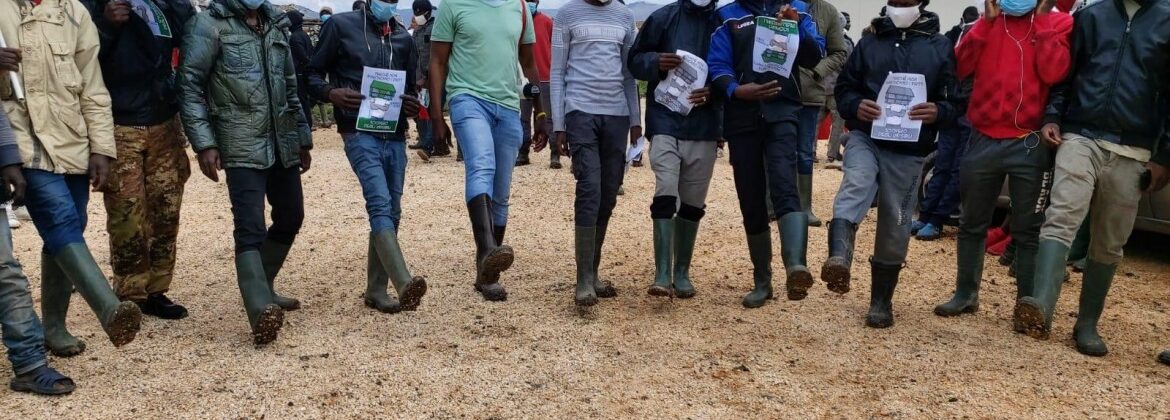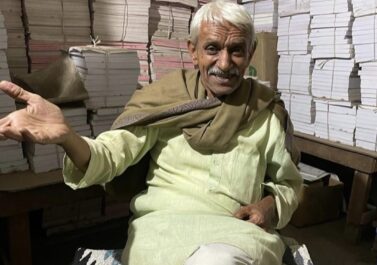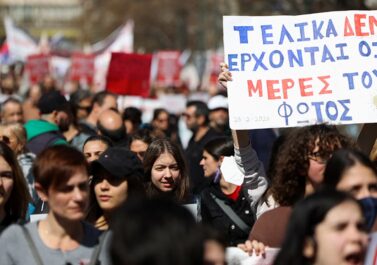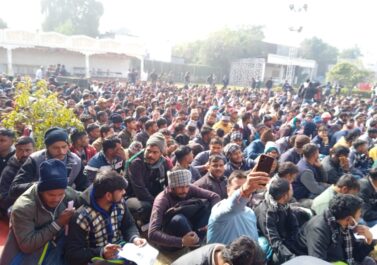We translated this text from Wildcat no.106 (www.wildcat-www.de) because it shows that even under conditions of formal illegality, migrant workers can reject the appeasment and control strategies of NGOs and charities and ‘fight for their rights’. The text also shows that the demand to obtain citizen rights can only become a useful part of the struggle once it becomes attached to the actual workers’ struggle against exploitation and for greater class unity.
The share of migrants in agricultural work in Italy has grown steadily over the last 30 years. This is nothing new; people have always tried to escape from being a farm worker, leading to the recruitment of new, weaker groups to work in the fields. In the past, workers living in the vicinity of the agricultural areas were replaced by people from the interior of the country; then men were replaced by women. Today, agricultural work is ethnically divided – and this tendency is becoming more acute: in 1992, 38,481 migrants worked in agriculture, and by 2018 this figure had increased to 275,347 (out of a total of about one million workers in the primary sector). However, these official figures do not include the huge area of irregular work and undeclared work, which is particularly important in agriculture.
For migrants, agriculture is the first and most frequently used, often informal, point of entry into the labour market. Over the years there has been a continuous change, with the workers who have been there the longest gradually giving up their jobs to those who arrived last. In the 1990s it was mainly Albanians and Moroccans, later Romanians and Bulgarians joined, and today many refugees work in agriculture. Asylum seekers from sub-Saharan Africa live socially segregated in the fields, where there are fewer controls and they have the chance of an undocumented income. This is where the weakest part of the agricultural workers who are ‘trapped in the fields’ gathers: it is mainly male migrants from sub-Saharan countries with precarious legal status (asylum seekers, rejected asylum seekers, illegal immigrants, etc.) who are forced to live a segregated life in extreme poverty and are therefore willing to work in a very mobile, flexible and precarious way.
At harvest time, there are seasonally and regionally high concentrations of irregular workers – in summer in Puglia for the tomato harvest or in winter in Calabria for the citrus harvest. The lack of any infrastructure for recruiting, housing and transporting seasonal workers also leads to the more or less open forms of caporalato. The ‘caporalato’ is a southern Italian mafia-like exploitation system. The ‘caporale’ has a van and early in the morning he gathers day labourers in the villages and transports them to the fields or to illegal construction sites. He usually collects between 50-60% of the wages. Instead of the ‘state-enforced sedentariness’ – perverse effect of a policy of migration control – there is a ‘forced mobility’ from one fruit or vegetable harvest to the next, which further complicates integration into society and the labour market.
In the plains of Gioia Tauro, Tavoliere di Foggia, Volturno near Naples, in the agricultural areas of Basilicata and in Sicily, shanty towns have sprung up, often without any facilities (water, electricity, toilets), where more than 2,000 people live at harvest time. They are regularly cleared and destroyed by the state and then inevitably rebuilt, often in even more hidden and inhospitable areas.
The Corona outbreak
The spread of the coronavirus has made these precarious living conditions even worse: there were only a few voluntary health projects and even they could barely help those affected. Many migrant workers no longer want this professional ‘solidarity’ by charities who receive millions of euros for their projects while the workers are still living in the dirt and exploitation continues. In the largest and oldest settlements (Rignano/Apulia and San Ferdinando/Calabria) the agricultural workers have thrown out the people from the charities. This came after these had tried – supposedly as an anti-Covid-19 measure – to contain the inhabitants in these informal settlements with roadblocks and punishments for two months. This temporary blockade and the late start of the harvest in Spring (strawberries, asparagus, etc.) have made survival conditions in rural ghettos even more difficult and precarious.
In this scenario, some grassroots trade unionists of the USB (Unione Sindacale di Base) started a petition campaign and economic support for the rural workers under the slogan: “We put food on the table, but we have to starve”. Not only did they collect PPE masks and food and distribute them to the people in the shanty towns, but during the total blockade of freedom of movement they also strengthened relationships of solidarity, thus undermining the obstacles to political or rank-and-file union initiatives.
The fight against the Covid-19 measures
As in the rest of the world, during the Covid-19 pandemic, Italy rediscovered the importance and value of agricultural work – and those who harvest the fruits of the earth that end up on our tables. However, the public answers to the question of labour shortage in the agricultural sector remained stuck in the quagmire of Realpolitik and political opportunism. The most ‘natural’ capitalist mechanism for compensating for an imbalance caused by a lack of supply on the labour market – namely a wage increase! – did not feature in the public debate. Instead, everything revolved around the demands of the employers’ associations to bring in seasonal workers from Eastern Europe, despite borders being closed, and/or state incentives for the return of the ‘natives populations’ to the fields, whether on short-time work, unemployment benefits or even retirement pensions. Some even demanded compulsory work for the recipients of ‘citizen’s income’, i.e. a kind of deportation to the fields, if they did not want to lose their entitlement to the minimum social benefit.
In this context, a debate also began about the legalisation of thousands of immigrant workers who work in agriculture and have to fight every day with the bureaucracy for their residence permit. This fight has become even more difficult since the adoption of some clearly racist and discriminatory measures (the so-called ‘Salvini Decrees’), as they have made tens of thousands more immigrants illegal and invisible. These regularisation measures have been watered down by xenophobic currents in the government, resulting in a purely utilitarian approach, in which regularisation serves only to counteract the labour market crisis for agricultural work in the summer harvest season.
The procedure puts the onus on the bosses about whether or not to use this regularisation procedure, and further strengthens their power to divide and intimidate the workers. Any permits will only be granted for six months and only if the worker is employed in agriculture or domestic care. There is actually also a possibility of traditional legalisation without having to ask the boss for the favour, but only for those who have previously been employed in agriculture with a formal legal contract and whose residence permit has expired in the last eight months. The procedure is therefore only of interest to very few of the irregular workers – and is more aimed at alleviating the suffering of the aubergines and tomatoes than that of the workers.
In contrast to this approach, the support campaign – “We put food on the table, but we have to starve” – immediately became a springboard for workers to respond directly and spontaneously to the hypocrisy of this pseudo-legalisation. In the fields, workers decided to go on strike on the 21st of May. Hundreds of workers from the shanty towns in Puglia and Calabria, but also from other rural areas of Italy, took part. Since dawn, pickets blocked the access roads to the shanty towns to prevent the transporters from entering and recruiting workers, thus preventing the harvesting of asparagus and the planting of tomato seedlings.
The agricultural workers’ struggle for the general legalisation was supported by dozens of rallies in front of the prefectures of the main Italian cities (Bologna, Milan, Rome, Naples, etc.). In Foggia, a procession of about a thousand agricultural workers set off from the settlement of Torretta Antonacci (the former great ghetto of Rignano) and crossed the fields where the workers break their backs every day, trying to reach the city. The chief of police had only allowed access for a small delegation of demonstrators. The siege of Foggia and the solidarity support initiatives in the other cities was a moment where the state-enforced straight jacket was broken. So too the silence and the paralysis of political and union activity that had been in place for months.
At the end of the action, the delegation left sacks of fruit and vegetables outside the prefecture and refused to meet with the local authorities to negotiate about regularisation. The success of this mobilisation and the support of large sections of society show how the spread of the virus has helped to shake the prevailing belief in the self-healing powers of the market in areas that are central to human life, such as public health or agriculture and food: Covid-19 could encourage reflection and trigger a mobilisation against food production based on the intensive exploitation of the earth and of workers. This intensification of agricultural and animal production obviously played a role in the creation of the corona virus: the genetic simplification compared to the natural complexity of ecological systems, the massive use of agro-chemicals and biotechnological innovations help the virus to jump from pathogenic ‘agents’ to some animal species and from there to humans.
This is another reason why the strategic alliance between agricultural workers, small producers and consumers is important. Undoubtedly the most important result of this mobilisation has been the establishment of the first processes of trade union organisation within the informal settlements. For years, the various associations and trade union organisations have played a supportive role from outside, only recruiting a few individuals. The agricultural workers were seen rather as poor people in need of help and repentance. The fact that today the trade union delegates of the USB are themselves agricultural workers who live in the shantytowns, that trade union offices are being set up in the informal settlements, marks an important step towards the social self-organisation of migrant agricultural workers.
For decades, ‘trade unions’ were not more than a para-state service agency for the native and immigrant workers; now they are a tool that the rural workers can use to enforce their rights. In this difficult situation, it was decided to first tackle things like the water and electricity supply and basic sanitation, and then to defend the self-management of the informal settlement – a point at which the internal cohesion of the migrant farm workers prevailed against the majority of aid agencies, against politics and the traditional trade unions. Because, in contrast to many observers from outside, the overwhelming majority of ghetto inhabitants have no doubts if confronted with the choice between ‘informal self-built huts and dirt’ or ‘barbed wire and charity-provided tent cities’: freedom and self-determination cannot be bought.
It is a difficult and seemingly paradoxical decision – to choose self-managed misery. But the rules and regulations of the semi-segregationist charity model, which were enforced after the evacuation of the surrounding shanty towns of San Ferdinando in Calabria, are a decisive factor for this decision: these rules include controlled access to the accommodation, monitored by digital fingerprints, entry and exit only at certain times, visiting permits, bans of all kinds. This and the overcrowded government tents, where it is hot in summer and freezing cold in winter, make these places more like a prison than accommodation for seasonal workers.
In Foggia, on the other hand, the resistance achieved the ‘best’ possible outcome on the day after the demolition of the large Rignano ghetto (when two Malian workers charred to death in the fires that accompanied the evacuation): the settlement was rebuilt just a few days later next to the ruins of the old ghetto. In 2019 the social mobilisation succeeded in forcing the installation of shelters close to the informal settlement, to which several hundred workers had access without any form of control or regulation. The shanty town is obviously not the goal, but the starting point for demanding the right to housing.
The following months will be fundamental for the consolidation of these processes of organizing and mobilizing agricultural work. We will try to organize work brigades to overcome the control of the Caporali. The Caporalato is a serious problem that must be confronted, but it is not the only problem, as the state and employers’ organizations would have us believe, in order to absolve themselves of any responsibility.
However, apart from housing and work, the main battlefield remains the residence permit, because it represents the ‘right to have rights’. It is primarily a matter of widening the gaps of the sanatoria (subsequent legalisation) [1], because otherwise only a minority of the migrant workers exploited in the fields today will benefit. To this end, every single step of the process needs to be monitored in order to prevent arbitrariness and corruption, which unfortunately always occurs at such moments.
At the end of May there were various meetings in the informal settlements in Calabria and Puglia to organize this monitoring, but also a mobilisation campaign. The aim is to generalize the legalisation measures, that is, a residence permit for all migrants, regardless of the sector in which they work. It is a matter of building a social alliance, starting from the weakest and most exploited link, the migrant farm workers, for the defence and conquest of dignity and the rights denied to all those who are exploited.
Francesco Caruso
[1]
The subsequent legalisation was proposed by Renzi’s party, Italia Viva, and supported by the Minister of Agriculture Bellanova. The entire right wing of the opposition and the government (i.e. a large part of the five-star movement) opposed it proudly. After a major publicity campaign, a decree was issued in May, but only one out of 118 articles actually concerns the regulation of migrant workers (Article 103). It is so limited that one must question the sense of such a government initiative. The limitations start with the requirement that migrants must prove that they have resided in Italy for a longer period of time, which is difficult. Another limitation is the fact that residence permits which can be obtained are extremely short. The number of applications submitted speaks for itself; 220,000 were expected by 15 July, and by the end of June only about 25,000 applications were registered, of which about 5,000 were agricultural workers. In 2009 there were almost 300,000 regularisations, in 2012 about 200,000. This country has just overcome the most dramatic phase of the corona epidemic, with disasterous conditions in healthcare, especially in Lombardy (the so-called ‘most developed’ region of Italy). And the regime is unable to find a way out of its dependence on a development model that exposes ever broader sections of the local and migrant population to conditions of exploitation and social marginalisation. The migrants made illegal by the Salvini Decrees are only partially and provisionally integrated. This means that the slave-like conditions in agriculture in the north and south of the country will be maintained as a prerequisite for the ‘Made in Italy’-model. Together with undeclared work in the household and in the small businesses scattered across the country, they support a social order that the current government cannot change, due to its internal contradictions. These contradictions are obviously due to the political influence of their constituents. A considerable part of them derive benefits, in the form of income and services, from the perverse intertwining of an informal economy, sometimes blurring with the criminal sector, with so-called civil society. The decree is now before a parliamentary committee, which is to convert it into a law. It remains to be seen whether the parliamentarians are capable of a jolt of personal decency and whether they will change article 103.



